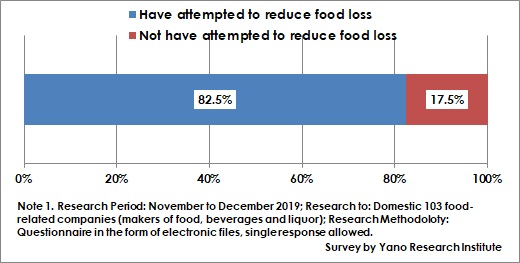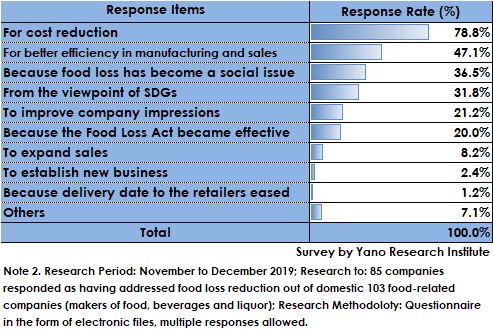No.2368
Food Loss Reduction by Enterprises in Japan: Key Research Findings 2019
Entire Food Industry Becoming Vigorous in Food Loss Reduction Due to Increased Impulse
Yano Research Institute (the President, Takashi Mizukoshi) has extensively surveyed and analyzed not only the food industry but also the peripheral companies on the current status of and the environment surrounding food loss reduction, and has found out the whole picture of diminishing food loss in Japan.


Summary of Research Findings
According to the data by MAFF and Ministry of Environment, food loss in Japan amounts to around 6,400 thousand tons, annually. As news media reported on tons of seasonal food such as Christmas cakes, New Year “Osechi” feasts, and “Ehomaki” sushi being discarded after the end of respective events, food loss has suddenly drawn attention in recent years as an issue to be solved.
In fact, food loss reduction has already been addressed mainly by food related companies, with the reasons being to reduce costs and increase efficiency, as well as in many cases from the environmental and social viewpoints. Recently, there emerged some startups and some large companies from other industries trying to solve the problem by turning the issue into business.
A variety of business models has come forth: Many of which have a high affinity to startups of platform business, for it can be launched by just using websites and smartphone apps without the need of manpower, such as food sharing services that can connect consumers with leftover ingredients or some dishes that have passed the expiration date for sales.
Also, technological innovation has enabled some companies to provide some materials that help reduce food loss in addition to their usual existing business operations. A more direct case can be some companies providing newly-developed products that use potentially wasted food, and some other attempts are use of AI for forecasting the potential food demand, aiming to diminish food loss.
Noteworthy Topics
Attempts of Food Loss Reduction Already Started at Many Food Makers
According to the questionnaire that took place during the period between November and December 2019, regarding the attempts to reduce food loss to 103 domestic food related enterprises (makers of food, beverages, and liquors), the rate of the companies that have responded as having made some efforts for food loss reduction accounted for 82.5%. When observing this by category, high percentages were overall obtained, as 84.4% of all food makers, 73.3% of all beverage makers, and 81.8% of all liquor makers responded that they have been trying to reduce food loss.
For the reasons why the companies make efforts for diminishing food loss (multiple responses allowed), the largest number of the response was “to reduce cost” occupying 78.8%, followed by “for better efficiency in manufacturing and sales” 47.1%. When asked about what makes wasted food (single response allowed), the largest number of response was “food edges and residue from processing and cooking,” indicating how reducing of waste at the time of food manufacturing will save costs and lead to food loss reduction.
Research Outline
2.Research Object: Food related companies (makers, wholesalers, retailers, restaurant operators), and companies providing food loss reduction services, etc.
3.Research Methogology: Face-to-face interviews by the expert researchers, surveys via telephone, and literature research
What is Food Loss Reduction?
Food loss is the food that is discarded, though edible.
<Products and Services in the Market>
Nonstandardized food, wasted food
Published Report
Contact Us
The copyright and all other rights pertaining to this report belong to Yano Research Institute.
Please contact our PR team when quoting the report contents for the purpose other than media coverage.
Depending on the purpose of using our report, we may ask you to present your sentences for confirmation beforehand.